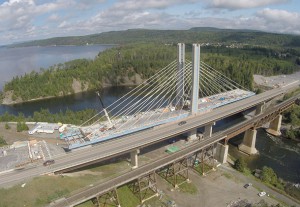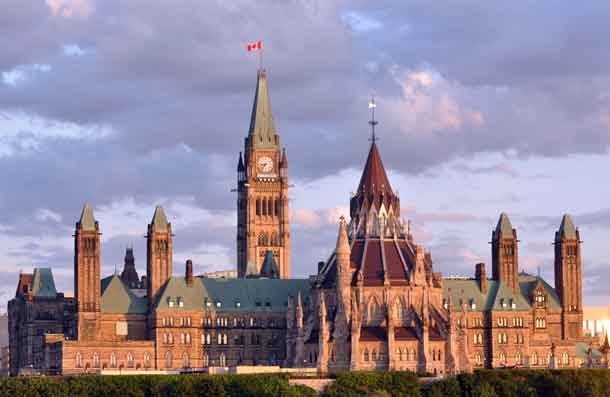Wet’suwet’en peoples and Gidimt’en Camp Protests Continue
THUNDER BAY – Wet’suwet’en peoples and others who are opposed to the construction of a pipeline by Coastal GasLink set up a checkpoint at a bridge located near the Gidimt’en camp, which effectively prevented access to the project site by Coastal GasLink. A December 14, 2018, British Columbia Supreme Court injunction prohibited opponents of the pipeline from interfering with or impeding persons or vehicles from accessing an area south of the Gidimt’en camp to carry on pipeline business, including pre-construction and construction activities.
The Hereditary Chiefs and supporters stated that the unceded territory is outside of the jurisdiction of the RCMP, the courts, and the Governments of Canada and British Columbia.
What is a Hereditary Chief?
Hereditary chiefs, as the name implies, are those who inherit the title and responsibilities according to the history and cultural values of their community. Their governing principles are anchored in their own cultural traditions. Hereditary chiefs carry the responsibility of ensuring the traditions, protocols, songs, dances of the community, which have been passed down for hundreds of generations, are respected and kept alive. They are caretakers of the people and the culture. (Source: Indigenous Corporate Training)
The Government sent in the Royal Canadian Mounted Police to dismantle the checkpoint and enforce the court injunction.
Many seem deeply concerned over the actions of the Royal Canadian Mounted Police in this incident, as the RCMP moved resources and personnel into Houston, British Columbia and ran an operation to dismantle the checkpoint.
There appear to be bigger issues. First that the RCMP were not operating in this operation on their own decision, the police were ordered in and told what they were to do.
Second is that there appear to be serious concerns over the actions of the provincial and federal government in this incident. Those actions have supporters of the Wet’suwet’en peoples and the Gidimt’en camp stating that the United Nations Declaration on the Rights of Indigenous people are being ignored.
Jorge Barrera of CBC Indigenous is reporting, “In addition to opposition from the hereditary chiefs of Wet’suwet’en Nation, the proposed Coastal GasLink natural gas pipeline faces another battle that TransCanada says could put the project at risk.
“The National Energy Board (NEB) launched a multi-step process last fall to determine whether the $4.8-billion pipeline should fall under federal jurisdiction and perhaps undergo further regulatory review — potentially delaying the project for months.”
It appears however that information was not part of the information that the BC Supreme Court was provided.
Senator Murray Sinclair, a former judge states, “It clearly appears that the injunction judge made a decision without all of the facts.”
“There is an NEB application claiming that the pipeline project is under federal jurisdiction and has not been reviewed and assessed by the federal agency. That information was not mentioned. That renders the validity of the injunction questionable,” said Sinclair.
“This is a dispute which raises the legal obligation of the Federal Government, contained in the Royal Proclamation of 1763, and confirmed by the Federal Government’s commitment to abide by the United Nations Declaration on the Rights of Indigenous Peoples, to obtain consent from the Indigenous peoples involved (not the federally funded Indian Bands created by Federal law – the Indian Act) before trespassing on their lands. This confrontation has been portrayed as ‘protesters’ opposing a pipeline and there has been no discussion concerning the question of Crown sovereignty”.
Sinclair asks, “What is the Crown’s obligation to gain consent to use land not yet within the jurisdiction of the Crown. In ordering police enforcement, the injunction judge was concerned that people opposing the pipeline construction were not prepared to obey the order to dismantle the camps. When you are standing up for your sovereignty, why would you obey a court decision sought and obtained by a corporate capitalist, that does not deal with that issue?”
In a background statement issued by the RCMP’s BC North District office in Houston on January 6, 2019, titled, “Background on BC RCMP’s role in enforcing injunction order” the RCMP stated that “…it is our understanding that there has been no declaration of Aboriginal title in the Courts of Canada.”
FNS Task Group member Grand Chief Ed John said “We take issue with the erroneous statement made by the RCMP about Aboriginal title. The Supreme Court of Canada made a declaration of title in the landmark Tsilhqot’in decision and Aboriginal title has been recognized as an existing legal interest in land in other landmark decisions such as Sparrow, Delgamuukw/Gisday’wa, Tsilhqot’in, Haida and Taku. Aboriginal title and rights are at the heart of this issue and the RCMP’s erroneous statement arguably compromises the force’s impartiality and neutrality.”
Grand Chief Ed John added that: “These legal pronouncements have been buttressed by political recognition of Aboriginal title and rights by Canada and BC. In his February 14, 2018 speech, Prime Minister Trudeau stated that the recognition and implementation of Aboriginal rights, which includes Aboriginal title, will be the basis for all relations between Indigenous Peoples and the federal government going forward. In a December 1, 2018 Principals Accord entered into by Canada, BC and the First Nations Summit, the parties acknowledge that Aboriginal rights and title are inherent and not contingent upon recognition by the Crown, government action, court declarations or agreements for their existence.”
After three days of talks, the Hereditary Chiefs and officials have come to an interim agreement that is allowing GasLink workers onto the proposed route.

Across Canada, there are protests planned. In Northwestern Ontario, there are plans to block the Nipigon Bridge northeast of Thunder Bay on Saturday from 1:00 PM to 4:00 PM.
Highways and roadways across Canada have rolling blockades and there are other protests including a round dance in Winnipeg at the corner of Portage and Main.
Prime Minister Trudeau was at a Town Hall meeting in Kamloops. The issue of the pipeline protest was raised at the meeting.
The Prime Minister was repeatedly questioned over the issues of the pipeline and reconciliation.
The Prime Minister has been facing opposition from a growing number of Indigenous groups over what is seen as a failure to live up to all of the promises that the Liberal government has made.
“No relationship is more important to Canada than the relationship with Indigenous Peoples. Our Government is working together with Indigenous Peoples to build a nation-to-nation, Inuit-Crown, government-to-government relationship – one based on respect, partnership, and recognition of rights” – Prime Minister Trudeau.






